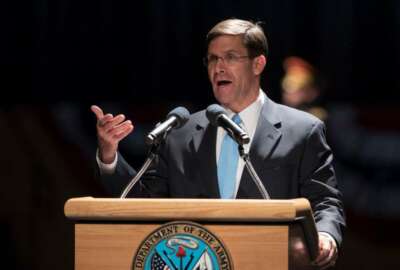To listen to the Federal Newscast on your phone or mobile device, subscribe on PodcastOne or Apple Podcasts. The best listening experience on desktop can be found using Chrome, Firefox or Safari.
- The National Park Service, the Postal Service and TRICARE remain the best-rated brands in the federal government, according to new numbers from market research company Forrester. Its annual CX index gave the lowest customer experience scores to the IRS, Healthcare-dot-gov, and USAJobs.gov. The federal government as a whole was ranked lower than airlines, car rental services, and health care providers. (Forrester)
- Agriculture Secretary Sonny Perdue announced USDA’s Economic Research Service and National Institute of Food and Agriculture will be moving to the Kansas City region. In a letter to USDA employees, Perdue says the Midwest area proved itself to be a hub of agriculture and there is already a significant federal presence there. (U.S. Department of Agriculture)
- More members of the Senior Executive Service said they would recommend it to others. The Office of Personnel Management surveyed 279 departing SES members. 66% of them say being a part of the SES is worthwhile, up from the 59% who recommended the SES in a past OPM survey. A majority of departing SES say their agencies have little to no succession plans in place to develop a leadership pipeline. (Chief Human Capital Officers Council)
- FEMA is short about 2,000 temporary reserve employees going into this hurricane season. Acting FEMA Administrator Peter Gaynor says the full time workforce is fully staffed, but it’s been more difficult to recruit and onboard temporary employees who can quickly respond to sudden disasters. Gaynor says FEMA recently reviewed its workforce plans. The agency is exploring how it can onboard new employees more quickly. It’s also expanding the Homeland Security Surge Capacity Force. (House Homeland Security Committee)
- Contracting with small businesses topped $100 billion for a second year in a row. The Small Business Administration estimates agencies spent more money with small businesses in fiscal 2018 than ever before, continuing the five-year upward trend. SBA told the Senate Small Business Committee yesterday that contracting with small firms last year achieved records across the board, including a seven year high in total dollars going to HUBZone companies. The agency also will finalize several long-awaited rules related to the 2016 Small Business Runway Extension Act. One of those will adjust the monetary based size standards to account for inflation since 2014. (Senate Small Business Committee)
- Army Secretary Mark Esper said the service is starting to get its arms around the privatized housing crisis in the military. The service is currently working on a tenant bill of rights with the other military branches. Esper told Federal News Network after the bill of rights is finished the Army will translate them into new agreements between residents and landlords. (Federal News Network)
- A new report gives some of the first estimates on the amount of greenhouse gases emitted by the military during the War on Terror. A study from Brown University’s Watson Institute states DoD released 1.2 billion metric tons of greenhouse gases for operations since 2001. That is equivalent to the annual emissions of 257 million cars. DoD has been more concerned about climate change as more waterways open up in the arctic, creating new tensions. DoD is also worried about bases dealing with rising sea levels. (Brown University)
- Command Sergeant Major Michael Grinston has been selected as the next sergeant major of the Army. The position is the branch’s most senior enlisted position. Grinston currently serves as the senior enlisted leader for U.S. Army Forces Command. He will take over for the current sergeant major of the Army, Dan Daily. (Army)
- The third nominee needed to restore a long-awaited quorum at the Merit Systems Protection Board sailed through his nomination hearing. Chad Bungard faced few questions from the Senate Homeland Security and Governmental Affairs Committee. Bungard said quickly reducing the backlog of pending petitions for review is his biggest priority. He is a former MSPB general counsel and now serves as deputy commissioner for analytics, review and oversight at the Social Security Administration. The MSPB has been without a quorum for over two years. (Senate Homeland Security and Governmental Affairs Committee)
- With the next Super Bowl months away, a new survey finds the Homeland Security Department and the other 50 plus agencies in charge of security with big events may need to rethink their approach. The survey by Unisys found while federal preparation is becoming more complex, integrating cybersecurity and physical security, consumers are as concerned about their data as their physical safety, even when attending large events like Super Bowl. (Unisys)
- DHS is planning to move the Federal Protective Service from under the control of the Cybersecurity Infrastructure and Security Agency, to the DHS management directorate. DHS said the transition will allow FPS to use and share the management directorate’s human capital and IT lines of business. FPS Director Eric Patterson said the move will also help his agency address longstanding fee and budget challenges. (House Homeland Security Committee)
- A bipartisan bill to ramp up cybersecurity for the Internet of Things got approval from the House Oversight and Reform Committee. The bill from Reps. Will Hurd (R-Texas) and Robin Kelly (D-Ill.) would set baseline standards for government-purchased IOT connected devices. Kelly introduced a version of the bill last year, but it never made it out of committee. Sens. Mark Warner (D-Va.) and Cory Gardner (R-Colo.) have introduced companion legislation in the Senate. (Rep. Robin Kelly)
- The EPA unveiled its enforcement priorities for the next four years. They’re known as national compliance initiatives, or NCI’s, and EPA settled on seven of them. The agency finalized them following a comment period that ended in March. Two new initiatives would strengthen enforcement of local drinking water quality standards and children’s lead exposure. Other enforcement targets cover air quality, sewage control and chemical releases. Compliance chief Susan Bodine said EPA’s focus is on outcomes, not specific industries. (Federal Register)
Copyright
© 2025 Federal News Network. All rights reserved. This website is not intended for users located within the European Economic Area.



